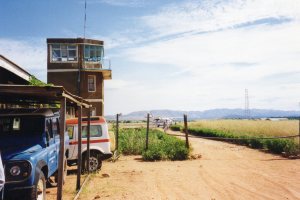The hotel Karibu was an amazing place. Out in the northern suburbs of Dar, on the Msasani Peninsula, the kind of twee, manicured and spacious neighbourhood that you find in any African city where colonists made their enclave, this hotel was nestled away. Not on the coast, it was in amongst the residential district with no outlook to mention. It was thirty minutes commute from the centre of town. It should never have existed, but it survived quite well. What was more bizarre was that it had a splendid entrance that would suit any five star hotel, a grand lobby with antiques adorning every part, a huge gleaming marble desk next to a gushing water feature, and alongside a marvellous restaurant with great food (but the AC was always too cold). But once you were checked in, you rose up to the next level and found yourself in the squalid conditions of so many big African city hotels; dingy corridors with carpets that smelt of twenty years of abuse (their was cat crap on the stairs for two days), rooms with ancient TV’s that hardly worked, light switches that were lethal and bathrooms that had been plumbed by a mate’s uncle who had once read a book on the subject.
I was starving, but the restaurant was only serving heavy stodgy dinners, so I wandered outside, ignoring the Tss..tss of the taxi drivers. I set off down a quiet road towards the coast and came across the Oysterbay Hotel with a small shopping centre next door. In amongst the shady squares here, I bought a few postcards and settled in a bright new café, had the most enormous hamburger and watched two white women discuss their quaint little social life on the peninsula while a small girl played with her food, her drink straw, her doll.
It was then I reflected on the trip I had just taken. From the throb of the electricity generator across from the Aqualodge, down the rutted sandy track to Kigoma Airport, past the refugee camps of Kibondo, the manic disorganisation of Mwanza, the tourist chic of Kili and the heat, dirt and mess of the centre of Dar, I was now in a modern shopping centre, enjoying a hamburger listening to idle European chit chat. All in one day, all in one country.



